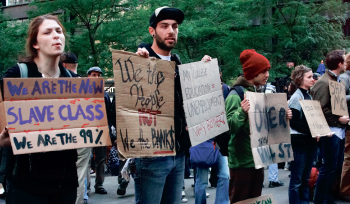Wall Street protest runs risk of being a political puppet
Without unity, protest is bound to miss its own goal
Activism is an essential component of democracy. Activists can inspire and educate, they can open up dialogues and sow seeds of discontent, but without a clear mission statement the protests of the counterculture can be manipulated by the very power they oppose. Just look at the current state of the Occupy Wall Street protests.

The 99 percent — Protestors speak out about corporate greed, skyrocketing college debt and more. Photo credit: Ashley Bollinger
The Democratic Congressional Campaign Committee (DCCC), the campaign arm of the Democrats in the House of Representatives, is seeking 100,000 signatures on a petition it is circulating asking party supporters to “stand with the Occupy Wall Street protests.” Democratic alignment with the Occupy Wall Street movement is misguided, as many occupiers are protesting the Obama administration’s decision to bailout rather than reform Wall Street. The movement has chosen not to have a spokesperson and, therefore, has no unified voice to comment on the DCCC’s endorsement.
On the other hand, the Republican National Committee is looking to use the protests against President Obama.
“The protests began with anger aimed at Wall Street, but the anger is also directed at the failure of leadership in Washington and that starts with the president,” RNC spokeswoman Kristen Kukowski said.
Statements such as this one concerning the overall message of the protest are also misguided. The protest is intentionally free of any specific goals.
Occupy Wall Street has spread well beyond the confines of downtown Manhattan, spawning over 1,500 solidarity protests throughout the world. The movement claims a method of “horizontal democracy,” meaning that every individual protester makes demands autonomously and these are reviewed in a daily “General Assembly” meeting. Their stated general goal is to represent the 99 percent of Americans not in the upper crust of the economy.
Some studies lend credence to the need to address economic inequality in America. American earners in the top one percent receive about 18 percent, nearly a fifth of the country’s total income, according to economists Thomas Piketty and Emmanuel Saez’s study of inequality on the Paris School of Economics website.
A free, democratic method of developing demands is an important concept and the Occupy Wall Street organizers deserve praise for creating a public forum for the expression of ideas. However, the economy is largely influenced by the government and many government officials are wealthy. Billions of dollars are spent on corporate lobbying efforts each year in order to influence officials in Washington. If either major political party aligns itself with the movement, then their protests become meaningless.
The mere concept of a government-sanctioned protest against government policy is not only ludicrous, it is also dangerous. It speaks of an Orwellian state, in which the voice of the people is manipulated by the party in power. Occupy Wall Street’s inability to comment about the political attentions focused on them reflect the democratic nature of their protest, but it also poses a major problem. They lack a single unified voice, opting instead for a cacophony of individual voices raised in protest. Democratic ideals are admirable, but without effective and timely agreement on issues like political endorsement, Occupy Wall Street may become a mouthpiece for those in power.
